
Chances are you're part of the 96% of companies that are participating in social media. In fact, you’re probably in the 92% who agreed that social media is important for their business. And, if you're working with an inexperienced social media agency, it could be costing you in a major way.
As a marketer, making sure your social media marketing efforts are playing a role in enhancing every aspect of your businesses isn’t just expected or required, it’s growing - just like everyone’s social media budgets.
What started as a way for friends to stay in touch has evolved into an incredibly powerful tool businesses can use to enhance the social media experience of their customers while also reaching prospects in order to convert into customers.
This day in age, the question isn’t whether or not to invest in social media for your business, it’s how can your social media marketing investment generate the highest return?
In this post, we’ll go into detail about how you should structure your social media team (agency vs in-house) and what to look out for if you’re already working with a social media agency.
If you can, you’re going to want to do your social media marketing in house.
There are a number of benefits of doing this, but there can also be a lot of risk. Determining whether or not you can do it effectively is where most tend to go wrong.
First, consider that the average size (65% of companies) of a social media team is around 1-3 people. 1-3 people may seem normal to most, but that’s where the problem tends to begin.
Next, the number of marketers who struggle to find a return on their social media efforts is about the same; 60%.
The reason is most teams tend to be extremely understaffed, limiting their ability to execute. It starts with not truly understanding how complex these platforms are and how they all need to play nice with other marketing efforts.
Committing to an in-house social media team can be a major challenge because these platforms are constantly evolving.
To give you an example, for Facebook to keep up with the demand and ahead of their competition, they release a new mobile App Update every 2 weeks with new features, tools, capabilities and more.
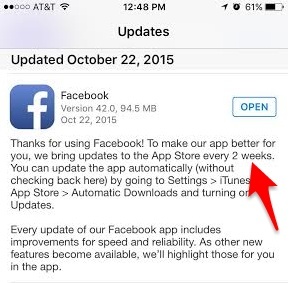
And that’s just keeping up with what’s new with Facebook!
That’s like trying to coach a team that can win, but the league keeps sending you a new rulebook every 2 weeks, or a chef having to use a new kitchen every time they want to cook.
Instead of being able to rely on a platform’s consistency, you’ll need to constantly adjust to the platform and rewrite your own strategy on a very consistent basis.
Keeping up with the constant changes, new releases, new tools, etc. of the social media landscape can take up a single person’s responsibility. To have a full social media team - that takes a lot of time and resources, and it just gets harder.
If you don’t have enough people to take on those responsibilities of research, strategy, planning, execution, etc. you’re outcomes are going to suffer.
Here are a few examples of what an effective social media team might actually looks like:
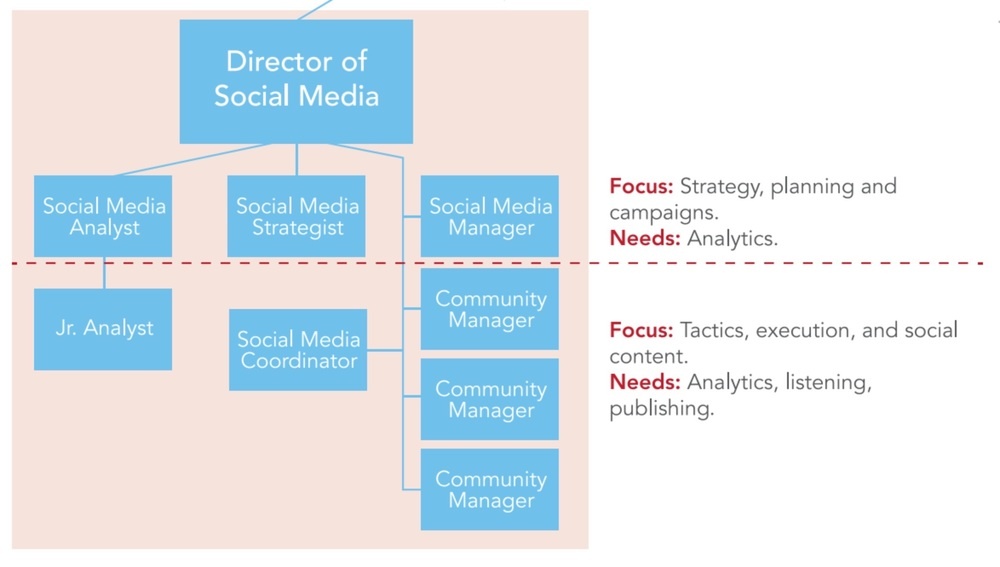
Or maybe this:
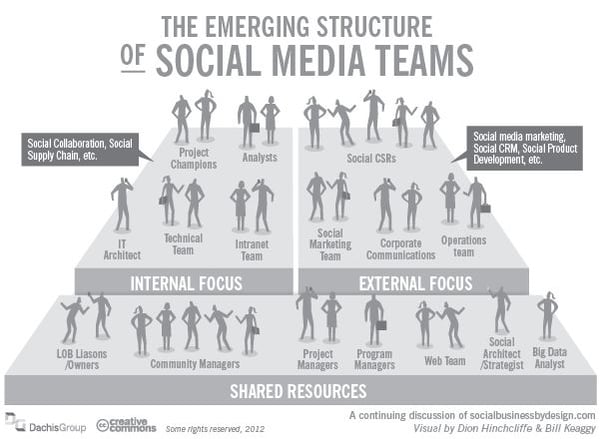
Again, if you can pull it off, structuring a social media team in-house can be very beneficial. But the investment can be fairly hefty if you’re not ready to commit, which is why most businesses opt for a social media agency.
If you’re still reading this, we think it’s safe to say you’ve gone the agency route. There are a number of things to consider when choosing the right agency.
There are a lot of resources out there if you’re looking to hire the right social media agency. Here are a few if you’re currently going through that process;
If you’re already working with a social media agency, and you’re not sure if you’re getting your money’s worth, here are some of the red flags to look out for in deciding whether or not you're getting back what you're spending.
Strategy is huge. Without a strategy, you won’t know what the end goal is, or how you plan to get there.
Especially when working with a team, not knowing the direction everyone is pulling in can be devastating.
“Participation in these (or other) social outposts are tactics used in service of a social media strategy, which in turn is in service of a marketing (and sometimes customer service/retention) strategy, which is one element of an overall business strategy.” – Jay Bear
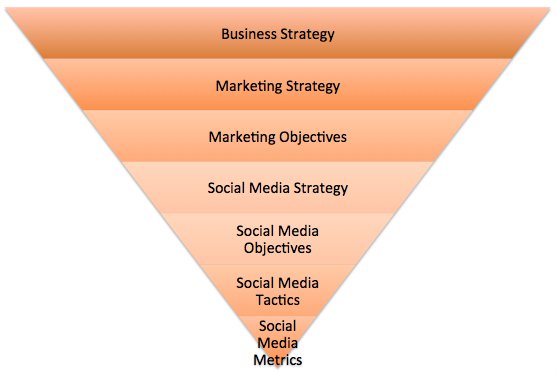
One way to recognize if you’re getting your money’s worth is by simply recalling whether or not you have a plan in place.
Did you ever talk about what you were trying to accomplish?
Social media has the power to affect a lot of what a business is trying to get out of it.
Maybe you're trying to provide better customer service through social media listening and monitoring. On the opposite side of the spectrum, you may want to optimize your efforts for lead generation.
If you and your agency aren't on the same page, you're expectations and their efforts could be going in two different directions.
Social media isn't something you "do".
Social media marketing is an activity that results in effective business outcomes.
As we previously mentioned, there are a lot of ways to do that. As experts, your social media agency needs to know every angle of social media well enough to, at the very least, explain how their activity contributes to your business goals.
Can they communicate their social media strategy in terms you can understand? Are they speaking your language?
You know your industry better than anyone. If the agency can’t communicate how their expertise and execution will contribute to your end goals, then they aren’t experts.
Also, watch out for social media buzzwords some of these agency’s use to throw you off rather than answering questions.
If you don’t understand, ask questions. It’s one of the reasons you hired them in the first place, right?
Reporting is another big one. Once you have a strategy in place, the right reporting keeps an agency in-check and gives insight into what’s working, what’s not and how to improve.
Or, did you have to ask?
This one’s pretty straight forward.
If they aren't providing you with any reporting, they're probably trying to keep something from you.
We've actually seen this first hand.
One of our clients had been working with an agency for nearly 6 months and was curious about how their $500/month Facebook Ads were contributing to generating leads. After requesting some insight, this is how the agency responded.
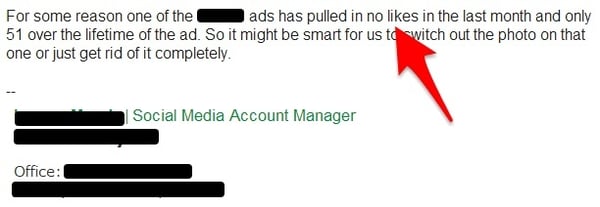
Your agency should be posting content that your followers actually find value in, or encourages them to take action.
Social media is just as much a lead generation tool as it is a retention tool.
Make sure your agency is tracking analytics and metrics that play a role in reaching your goals. Having the right metrics in place will tell you if they’re successful at reaching the right audiences, and influencing quality leads.
One way most agencies avoid this is by focusing on "Like's" and not true value such as engagement or clicks to your website along with website analytics to know if you’re getting quality leads.
Google Analytics will give you some really good insight into the type of traffic you’re presence is generating with measurements like new sessions, page views, bounce rates, etc.
Social media is a living, breathing network that runs 24-hours a day.
Every. Single. Day.
In order to have a thriving account on Facebook, Twitter, Instagram, or any other social media platform, especially when the team running those accounts aren't local to your business location, you need to have someone on the ground floor that can offer a heads up.
If there's one thing we know, it's that the more transparent you can be, and the more communication you have, the more success you’re going to see. Buffer, a company that offers social media scheduling tools, has committed to a culture of complete transparency to the point where they release the entire team’s equity, salaries, and company revenue. They even have it as one of their main company values - Default to Transparency.

A smart social media agency will always be testing to uncover opportunities and also learn from mistakes, because mistakes are going to happen.
Your agency needs to be the front line of defense for you when they encounter these hiccups. If you’re paying for something that isn’t working, your agency should be the first to tell you.
One reason great companies are able to develop a large and loyal customer base is by providing content and information their audience can’t get anywhere else.
Typically, most do this through blogging because of its amazing ability to generate web traffic and leads more effectively at a much lower cost.
Even heavy hitters like Eloque and Kapost have released statistics around Content Marketing ROI stating that, per dollar, content marketing produces three times more leads.
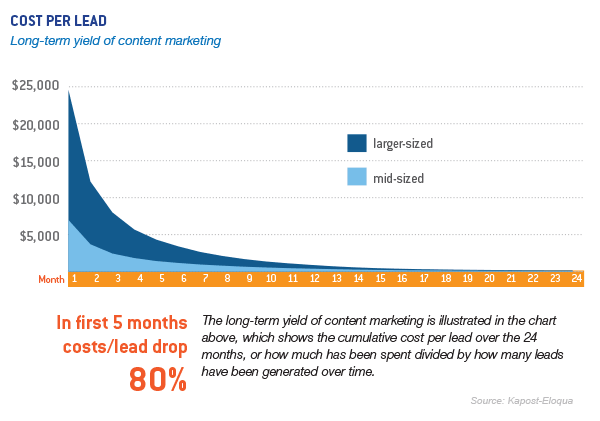
If you’re not generating your own content, you can always be a great curator of content.
For example, if you’re managing an account for an apartment building, posting information about various neighborhood events, happy hours, Meetups, etc. will give people who are local to your neighborhood a reason to follow and engage with you.
This one is simple, and it may not be for everyone, but we like to think it is. We only have so much time on this planet.
Above all, choose to work with people that make things easier, not harder.
For us, we wan't to surround ourselves with people that we love working with. An 8 hour work day can get pretty long and frustrating if you're not working with the right people.
These Stories on Social Media

San Diego, CA
600 B St.
San Diego, CA 92101

Austin, TX
600 Congress Ave.
Austin TX 78701

Washington, DC
1875 Connecticut Ave NW
Washington, DC 20009
Copyright © 2024 AM Digital, LLC Terms of Service Privacy Policy
Street Address
City, ST 00000
Call us: 1-800-COMPANY
(800-000-0000)